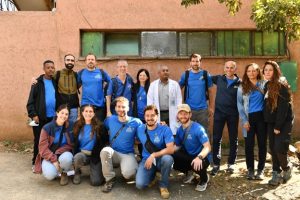
Natural resources development is a viable path for Green Economy. Directly or indirectly, the growth of a nation is strongly dependent on the success of land management interventions.
Knowingly or unknowingly, man has been posing a challenge on himself by changing the climate through land degradation. Land degradation is still a major problem since Ethiopia has been exporting its soil freely and obliviously to neighboring countries like Egypt.
Land degradation particularly soil erosion has a negative impact on the growth of the economy through reducing land productivity that causes food insecurity. Accordingly, reducing land degradation and improving natural resources are among the strategic objectives of the nation; especially, watershed and agroforestry development are the major elements given top attention.
Therefore, any local community should be the main part of the solution, because community participation is the best medicine of rehabilitating natural resources through setting up army structure.
Different governmental and non-governmental stakeholders have engaged in watershed and agroforestry development; however, the required integration and coordination among the stakeholders does not exist.
Ministry of Agriculture (MoA) strongly believes that establishing a multi-stakeholder platform narrows the gap among actors engaged in watershed and agroforestry development through cascading plans at all levels (regions, zones and woredas) next to federal.
Consequently, National Watershed and Agroforestry Multi-Stakeholder Platform (NWAMP) workshop had been held at International Livestock Research Institute (ILRI) here in Addis.
The program was aimed at discussing and reaching on consensus on organizational structure of NWAMP, roles and responsibility of stakeholders, accountability and functional relationship of members of the platform involving different stakeholders in watershed and agroforestry development initiatives throughout Ethiopia.
The idea of the program is to strategize multi-stakeholder platform and to organize a big workshop periodically i.e. annually to discuss on common objectives and visions, share experiences, approaches, lessons, knowledge, and skills.
On the occasion, experts, researchers, directors, and governmental and non-governmental stakeholders had engaged and shared multi ideas.
Tefera Tadesse, Natural Resources Management Director, has delivered opening speech on behalf of State Minister of Agriculture, Kaba Urgesa (PhD). According to Tefera, the main objective of this workshop is to establish multi-stakeholders platform and thereby improve natural resource management through harmonized, aligned, integrated and coordinated manner to share the draft National Watershed and Agroforestry Development Strategy documents and receive feedback before its endorsement.
As to Tefera, it is to establish National Watershed and Agroforestry Multi-Stakeholder Platform with interventions of multi stakeholders. “Because we don’t have strong integration among collaborators who are engaged in natural resources management and agroforestry development. This event is organized to bring all actors together,” he said.
Accordingly, different actors such as MoA, Ministry of Water, Irrigation, and Electricity, Environment, Forest, and Climate Change Commission, Research and Higher Educations, (Haromya, Mekele, Bahir Dar universities), Regional and National Research Institutes, International Center for Research in Agroforestry (ICRAF) and others will be integrated for improving natural resource development and management, the director stated.
Integrated and sustainable natural resource development and management cannot be successful with the delivery of one institution lonely rather it needs narrowing the gap among institutions through harmonization, alignment, and integration of multi-stakeholders as actors; yet, the coordination between multi-sectorial is not being strengthened at the expected level, Tefera said.
Strengthening integration among stakeholders is very crucial to sustain watershed achievements that minimizes efforts, creates common understanding among stakeholders, and facilitates opportunities to draw lessons from one another to bring synergetic effect, as to the director.
Professor Mitiku Haile, Researcher and instructor at Mekele University, who had presented his research pertaining to the role of partners in the watershed management and agroforestry, states that watershed management for Ethiopia is based on the indigenous knowledge of people particularly those who are living with watersheds that had been developing agricultural skills based on harmonized use of resources.
Professor Mitiku adds that, watershed in Ethiopia has been displaying a tremendous improvement in terms of biodiversity. In water shade, we had observed mass community participation .There was a raise in water table which farmers are using irrigation for multi-cultural crops now, Professor Mitiku stated.
As to him, the current experience of watershed and agroforestry development in Ethiopia needs a number of stakeholders to be involved. To that effect this platform had been conducted to bring many actors together.
Kiross Melese (Ph.D), Director of World Agroforestry Center in Ethiopia, this workshop aims at rehabilitating the degraded areas to support government’s strategy and Ethiopian green legacy that will help to rehabilitate the natural resources and climate change. There are promising outcomes conducted before. Yet, there is a lot to be desired. So, on scaling up the existing best experience of farmers sustainably is needed, Kiross said.
Of course, integrated natural resource managements have been carried out in some parts of Ethiopia for decades now. Encouraging results have been registered, Kiross pointed out.
Since the major segment of the community forms smallholder farmers, we should use agroforestry in conducting integrated forest, crops, and livestock development in productive and sustainable way to earn more products on piece of land, the director said. There are best experiences here in some areas of the nation. They have to be scaled up to other areas depending on the given resources, as to him.
We are establishing this platform to bring multi-stakeholders together to rehabilitate degraded land and improve farmers’ livelihood, Kiros summed up.
The Ethiopian Herald Sunday edition October 20/2019
BY BAHIRU SETEGNE





